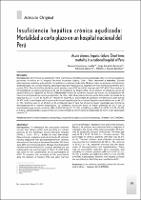Insuficiencia hepática crónica agudizada: Mortalidad a corto plazo en un hospital nacional del Perú
Related Resource(s)
http://cmhnaaa.org.pe/ojs/index.php/rcmhnaaa/article/view/479Date
2019-07-16Author(s)
Zambrano-Huailla, Rommel
Garavito-Rentería, Jorge
Lozano M., Adelina
Araujo Banchon, William J.
Metadata
Show full item recordAlternate title
Acute chronic hepatic failure: Short-term mortality in a national hospital of Peru
Abstract
Introducción: Determinar la asociación entre insuficiencia hepática crónica agudizada (ACLF) y la mortalidad en pacientes cirróticos en el Hospital Nacional Arzobispo Loayza, Lima - Perú. Material y métodos: Estudio observacional, analítico y de cohorte. Se realizó un seguimiento durante 28 días a todos los pacientes inicialmente diagnosticados con cirrosis hepática descompensada que ingresaron al hospital entre los meses de diciembre 2015 y junio 2016. Para la tipificación de los participantes como ACLF se utilizó la escala del CLIF-ACLF. Para evaluar la normalidad de los datos cuantitativos se usó el estadístico de Shapiro Wilk. En el análisis se utilizó las curvas de supervivencia y la regresión de Poisson. Resultados: Fueron 46 pacientes los que ingresaron con el diagnóstico de interés en el lapso de los meses ya referidos; de ellos, sólo 34 aceptaron formar parte del estudio. La media de la edad fue 63,12 ± 11,97. El 52,94% (n=18) fueron mujeres. El porcentaje de pacientes cirróticos con ACLF fue de 26.47% (n=9). La etiología más frecuente de cirrosis hepática fue la esteatosis hepática no alcohólica en un 44,12% (n=15), mientras que en un 29.62% (n=9) la infección bacteriana fue el motivo mayor reportado que originó su descompensación e ingreso hospitalario. Se evidenció asociación entre el haber padecido de ACLF con la mortalidad en pacientes cirróticos (RRa=5,81 IC95 % [2,22; 15,18]; p<0,001) y un HRa=5,63 (IC95 % [1,25; 25,27]; p=0,024). Conclusiones: Los pacientes con cirrosis hepática tienen mayor probabilidad de morir si son tipificados como ACLF. Introduction: To determine the association between chronic liver failure (ACLF) and mortality in cirrhotic patients at the Arzobispo Loayza National Hospital (HNAL),Lima,Peru.Materialandmethods: Observational, analytical and cohort study. All patients initially diagnosed with decompensated liver cirrhosis who entered the hospital between December 2015 and June 2016 were followed up for 28 days. The dependent variable was the mortality in cirrhotic patients and the independent one was having ACLF. The CLIF-ACLF scale was used for the classification of the participants as ACLF. To evaluate the normality of the quantitative data the statistic of Shapiro Wilk was used. Survival curves and Poisson regression were used in the analysis. Results:46 patients were admitted with a diagnosis of interest in the period of the referred months; Of them, only 34 accepted to be part of the study. The mean age was 63.12 ± 11.97. 52.94% (n = 18) were women. The percentage of cirrhotic patients with ACLF was 26.47% (n = 9). The most common cause of hepatic cirrhosis was non-alcoholic liver steatosis in 44.12% (n = 15), whereas in 29.62% (n = 9), bacterial infection was the major cause of decompensation and hospitalization. There wasanassociationbetweenACLFmortalityand mortality in cirrhotic patients (aRR=5,81 IC95 % [2,22; 15,18]; p<0,001) and aHR=5,63 (IC95 % [1,25; 25,27]; p=0,024). Conclusions: Patients with hepatic cirrhosis are more likely to die if they are classified as ACLF.






